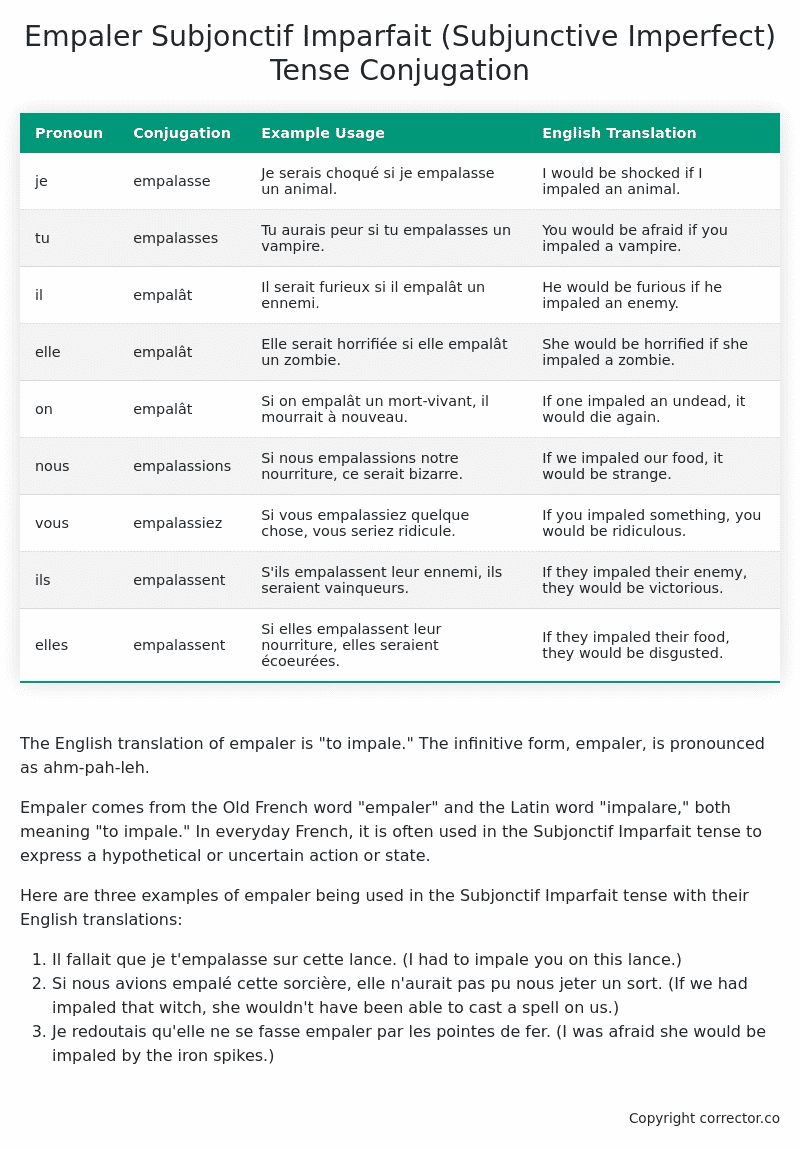Subjonctif Imparfait (Subjunctive Imperfect) Tense Conjugation of the French Verb empaler
Introduction to the verb empaler
The English translation of empaler is “to impale.” The infinitive form, empaler, is pronounced as ahm-pah-leh.
Empaler comes from the Old French word “empaler” and the Latin word “impalare,” both meaning “to impale.” In everyday French, it is often used in the Subjonctif Imparfait tense to express a hypothetical or uncertain action or state.
Here are three examples of empaler being used in the Subjonctif Imparfait tense with their English translations:
- Il fallait que je t’empalasse sur cette lance. (I had to impale you on this lance.)
- Si nous avions empalé cette sorcière, elle n’aurait pas pu nous jeter un sort. (If we had impaled that witch, she wouldn’t have been able to cast a spell on us.)
- Je redoutais qu’elle ne se fasse empaler par les pointes de fer. (I was afraid she would be impaled by the iron spikes.)
Table of the Subjonctif Imparfait (Subjunctive Imperfect) Tense Conjugation of empaler
| Pronoun | Conjugation | Example Usage | English Translation |
|---|---|---|---|
| je | empalasse | Je serais choqué si je empalasse un animal. | I would be shocked if I impaled an animal. |
| tu | empalasses | Tu aurais peur si tu empalasses un vampire. | You would be afraid if you impaled a vampire. |
| il | empalât | Il serait furieux si il empalât un ennemi. | He would be furious if he impaled an enemy. |
| elle | empalât | Elle serait horrifiée si elle empalât un zombie. | She would be horrified if she impaled a zombie. |
| on | empalât | Si on empalât un mort-vivant, il mourrait à nouveau. | If one impaled an undead, it would die again. |
| nous | empalassions | Si nous empalassions notre nourriture, ce serait bizarre. | If we impaled our food, it would be strange. |
| vous | empalassiez | Si vous empalassiez quelque chose, vous seriez ridicule. | If you impaled something, you would be ridiculous. |
| ils | empalassent | S’ils empalassent leur ennemi, ils seraient vainqueurs. | If they impaled their enemy, they would be victorious. |
| elles | empalassent | Si elles empalassent leur nourriture, elles seraient écoeurées. | If they impaled their food, they would be disgusted. |
Other Conjugations for Empaler.
Le Present (Present Tense) Conjugation of the French Verb empaler
Imparfait (Imperfect) Tense Conjugation of the French Verb empaler
Passé Simple (Simple Past) Tense Conjugation of the French Verb empaler
Passé Composé (Present Perfect) Tense Conjugation of the French Verb empaler
Futur Simple (Simple Future) Tense Conjugation of the French Verb empaler
Futur Proche (Near Future) Tense Conjugation of the French Verb empaler
Plus-que-parfait (Pluperfect) Tense Conjugation of the French Verb empaler
Passé Antérieur (Past Anterior) Tense Conjugation of the French Verb empaler
Futur Antérieur (Future Anterior) Tense Conjugation of the French Verb empaler
Subjonctif Présent (Subjunctive Present) Tense Conjugation of the French Verb empaler
Subjonctif Passé (Subjunctive Past) Tense Conjugation of the French Verb empaler
Subjonctif Imparfait (Subjunctive Imperfect) Tense Conjugation of the French Verb empaler (this article)
Subjonctif Plus-que-parfait (Subjunctive Pluperfect) Tense Conjugation of the French Verb empaler
Conditionnel Présent (Conditional Present) Tense Conjugation of the French Verb empaler
Conditionnel Passé (Conditional Past) Tense Conjugation of the French Verb empaler
L’impératif Présent (Imperative Present) Tense Conjugation of the French Verb empaler
L’infinitif Présent (Infinitive Present) Tense Conjugation of the French Verb empaler
Struggling with French verbs or the language in general? Why not use our free French Grammar Checker – no registration required!
Get a FREE Download Study Sheet of this Conjugation 🔥
Simply right click the image below, click “save image” and get your free reference for the empaler Subjonctif Imparfait tense conjugation!

Empaler – About the French Subjonctif Imparfait (Subjunctive Imperfect) Tense
Formation
Common Everyday Usage Patterns
Interactions with Other Tenses
Subjonctif Présent
Indicatif Passé Composé
Conditional
Conditional Perfect
Summary
I hope you enjoyed this article on the verb empaler. Still in a learning mood? Check out another TOTALLY random French verb conjugation!


